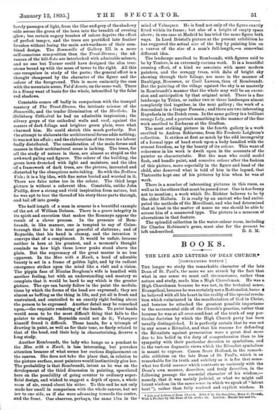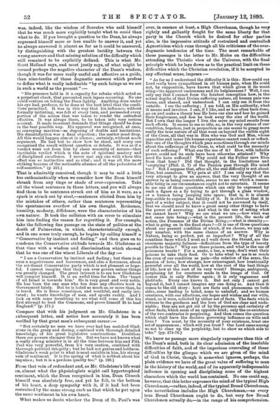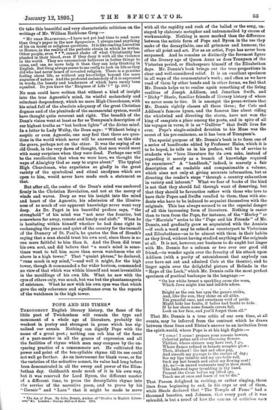BOOKS.
THE LIFE AND LETTERS OF DEA.N CHURCH.* [CONCLUDING NOTICE] THE longer we study the remarkable character of the late Dean of St. Paul's, the more we are struck by the fact that what in one sense we must call circumstance, rather than nature and study, made him a High Churchman. He was a High Churchman because be was not, in the technical sense, Evangelical, because he was certainly not a Rationalist, becau he believed with all his heart in the reality of the special revela- tion which culminated in the manifestation of God in Christ, and because he attached the greatest possible importance to the sacramental side of the Church's practice, rather than because he was at all over-confident of the truth of any par- ticular doctrine by which the High Church party has been usually distinguished. It is perfectly certain that he was not in any sense a Ritualist, and that his reasons for defending the Ritualists against persecution were a great deal more due to his belief in ti e duty of comprehension than to his sympathy with their patticular devotion to symbolism, and to the various dogmatic views which the Ritualist symbolism is meant to express. Canon Scott Holland, in the remark- able criticism on the late Dean of St. Paul's, which is as remarkable for its truth and subtlety as it is for that some- what too florid manner which contrasts so curiously with the Dean's own manner, describes, and truly describes, in the following passage the essential character of his wisdom,— namely, that it was mainly judicial, or what we might call latent wisdom (in the same sense in which we speak of "latent heat "), rather than fully realised and explicit wisdom. It
• We and Letters of Dean Chureh. Edit by his dauzbter. Mary C. ohorsh. With a Pr,face by the Dean of Ch isteha ch. London: Macmilan and Co. was, indeed, like the wisdom of Socrates who said himself that he was much more explicitly taught what to avoid than what to do. If you brought a question to the Dean, he always expressed himself more or less unable to answer it and yet le always answered it almost as far as it could be answered, by distinguishing with the greatest lucidity between the wrong answers and that missing solution of the difficulty which still remained to be explicitly defined. This is what Mr. Scott Holland says, and most justly says, of what might be termed perhaps the negative character of the Dean's wisdom, though it was far more really useful and effective as a guide, than nine-tenths of those dogmatic answers which profess to define what is really indefinable "by such beings as we are
in such a. world as the present "
" His presence held in it a capacity for rebuke which acted as a perpetual check, that prevented such lapses occurring. No one could venture on taking the Dean lightly. Anything done under his eye had, perforce, to be done at the best level that the condi- tions permitted. It was in this way that his influence, without formally initiating, was felt at every turn, and permeated every portion of the action that was taken to render the cathedral effective. It was always there, to be taken into very serious account. It made incessant demands that things should be done in the best possible way. His approval was recognised, at once, as conveying sanction—as disposing of doubts and hesitations. His dissatisfaction was a final objection ; the matter must drop. All this would happen almost in silence ; certainly, without much argument. He had but to show how he stood, and every one recognised the result without question or debate. It was as if a, verdict went out from him by sheer necessity of nature—that inevitable verdict which is the note of spiritual mastery and of disciplined excellence. I never met any one with whom this effect was so instinctive and so vital ; and it was all the more striking because of the noticeable absence of all the pedantries of self-assertion." (p 221.)
That is admirably conceived, though it may be said a little too enthusiastically when we consider how the Dean himself shrank from any tinge or shade of over-expression. Take all the wisest sentences in these letters, and you will always find them to be sentences struck out of him as it were, as a spark is struck out by steel,—sentences elicited from him by the mistakes of others, rather than sentences representing the spontaneous overflow of his own thought. Reticence, humility, modesty, diffidence, were the characteristics of his own nature. It took the collision with an error to stimulate him into finding the reason for regretting it. For example, take the following fine passage on the state of politics at the death of Palmerston, in which, characteristically enough, and in one sense truly enough, he begins by calling himself a "Conservative by instinct and feeling," and then goes on to cnidemn the Conservative attitude towards Mr. Gladstone at that time with a wisdom and discrimination which showed that he was one of the wisest Liberals of the day :—
" I am a Conservative by instinct and feeling ; but there is at once a negativeness and barrenness, and also a fierceness, about the soi-disant Conservative party which is not pleasant or hope- ful. I cannot imagine that they can ever govern unless things are greatly changed. The great interest is to see how Gladstone will comport himself. It is an awful time for him. The 'heart 44 all Israel is towards him.' He is very great and very noble. He has been the one man who has done any effective work in Government lately. But he is hated as much as, or more than, he is loved. He is fierce sometimes, and wrathful, and easily irri- tated; he wants knowledge of men, and speaks rashly. And I look on with some trembling to see what will come of this his first attempt to lead the Commons, and prove himself fit to lead England." (p. 171.)
Compare that with his judgment on Mr. Gladstone in a subsequent letter, and notice how accurately it has been verified by that great man's subsequent career :—
" But certainly no man we have ever had has matched Glad- stone in the grasp and daring, combined with thorough detailed knowledge, of his great legislative constructions. Doubtless there are powers stronger than he. But we have not known what a really strong minister is in all the time between him and Pitt. Peel was very powerful, from his very caution, combined with thorough 'political integrity ; but he had not genius and boldness. Gladstone a weak point is what is most amiable in him, his strong vein of sentiment It is the spring of what is noblest about his impulses ; but it is a perilous quality too." (p. 188.)
From that vein of redundant and, as Mr. Gladstone's life went on, almost what the physiologists might call hypertrophied sentiment, which the Dean recognised in him, Dean Church himself was absolutely free, and yet he felt, to the bottom of his heart, a deep sympathy with it, if it had but been restrained by the same strong curb as that which he put upon the same sentiment in his own heart.
What makes us doubt whether the Dean of St. Paul's was ever, in essence at least, a High Churchman, though he very rightly and gallantly fought for the same liberty for that party in the Church which he desired for other parties also, is the impressive attitude of restrained and controlled Agnosticism which runs through all his criticisms of the over-. dogmatic tendencies of the time. The most remarkable of these passages is the letter to Mr. Mules on the difficulties attending the Theistic view of the Universe, with the final principle which he lays down as to the practical limit on these difficulties which the Christian revelation, if it be accepted in any effectual sense, imposes :—
" As far as I understand the difficulty it is this : How could mu Lord really have sympathised in all human pain, when He could not, by supposition, have known that which gives it its worst. sting—its apparent uselessness and its helplessness ? Well, I can only say that I cannot form the faintest conception how, in the, actual depths of that Divine suffering nature, all human pain was borne, and shared, and understood. I can only see it from the outside. I see the suffering ; I am told, on His authority, what it means and involves. I can, if I like, and as has often been done, go on and make a theory how He bore our sins and how he gained their forgiveness, and how he took away the sins of the world. But I own that the longer I live the more my mind recoils from such efforts. It seems to me so idle, so, in the very nature of our' condition, hopeless, just in proportion as one seems to grasp more really the true nature of all that went on beyond the visible sight of the Cross, all that was in Him who was God and Man, whose capacities and inner life human experience cannot reach or reflect. But one of the thoughts which pass sometimes through our minds about the sufferings of the Cross, is, what could be the necessity of such suffering ? What was the use of it ? How, with infinite power, could not its ends have been otherwise attained ? Why need He have suffered? Why could not the Father save Him from that hour ? Did that thought, in the limitations and 'emptying' (Phil. ii. 7) of the Passion pass through His mind too ? But I suppose that, after all, the real difficulty is not about Him, but ourselves. Why pain at all? I can only say that the very attempt to give an answer, that the very thought of an answer by us being conceivable, seems to me one which a reason- able being in our circumstances ought not to entertain. It seems to me one of those questions which can only be expressed by such a figure as a fly trying to get through a glass window,. or a human being jumping into space ; that is, it is almost impessible to express the futility of it. It is obvious that it is part of a wider subject, that it could not be answered by itself, that we should need to know a great many other things to have the power of answering. And what is the use of asking what we cannot know ? Why we are what we are ;—how what was not came into being ;—what is the present life' the mode or action, the Presence of the Divine Being ;—what is eternity ;— what is going on in the fixed stars P—It is one of those questiona about our present condition of which, if we choose, we may ask any number, with the same chance of an answer. Why is Nature, being so perfect, yet so imperfect ? Why of all the countless faces which I meet as I walk down the Strand, are the enormous majority failures—deflections from the type of beauty possible to them ? Why are there poisons, and what is the use of poisonous beasts ? For a snake, a bee, a wasp, don't want their poisons to take their food. Or to take what to me is as much the crux of our condition as pain—the relation of the sexes, the passion of love; how strange, how extravagant, how irrationally powerful over all the world, how at the root of the best things of life, how at the root of its very worst? Strange, ambiguous„ perplexing lot for creatures made in the image of God. Of course this is only Butler again; it is only vagueness and platitude. Every one knows it. But not only I cannot get beyond it, but I cannot imagine any one doing so. Ind then it comes to the old story : here are facts and phenomena on both sides, some leading to belief, some to unbelief; and we human creatures, with our affections, our hopes and wishes and our wills, stand, as it were, solicited by either set of facts. The facts which, witness to the goodness and the love of God are clear and unde- niable; they are not got rid of by the presence and certainty of other facts, which seem of an opposite kind; only the co-existence of the two contraries is perplexing. And then comes the question which shall have the decisive governing influence on wills and. lives ? You must, by the necessity of your existence, trust one set of appearances ; which will you trust ? Our Lord came among us not to clear up the perplexity, but to show us which side to take." (pp. 274-76.)
We know no passage more singularly expressive than this of the Dean's mind, both in its clear admission of the insoluble difficulties of faith, and of the imperious overruling of these difficulties by the glimpse which we are given of the mind of God in Christ, though it somewhat ignores, perhaps, the plain evidence we have of the great value of suffering to man in the history of the world, and of its apparently indispensable influence in opening and disciplining some of the highest characters which the world has contained. No one could say, however, that this letter expresses the mind of the typical Higb Churchman,—rather, indeed, of the typical Broad Churchman, who nevertheless includes the High Churchman,—as every true Broad Churchman ought to do, but very few Broad Churchmen actually do,—in the range of his comprehension.. Or take this beautiful and very characteristic criticism on the writings of Mr. William Rathbone Greg :—
" My DEAR BLACHFORD,—I have not yet had time to read more than Greg's paper in the new Symposiu.n. I always read anything of his on moral or religious questions. It is like reading Lucretius or Horace, in the reality of the pathetic strain in which he writes. Other people, even * * *, cannot shake off what Christianity has planted in their blood, even if they deny it with all the violence in the world. They are unconscious believers in better things to come, and can no more help it than they can help thinking in English. But Greg always seems to me really to look on life as they did who had never heard of revealed religion. There is a genuine feeling about life, as without any knowledge beyond the mere auguries of nature. And the profound melancholy of it is expressed in words, the beauty and tenderness of which have rarely been equalled. Do you know the Enigmas of Life ' ? " (p. 203.)
No man could have written that without a kind of insight into the true Agnostic's mind, its wistful melancholy and reluctant despondency, which no mere High Churchman, with his mind fall of the absolute adequacy of the great Christian dogmas and of the plenitude of the sacramental system, would have thought quite reverent and right. The breadth of the Dean's vision went at least as far as Tetuayson's description of our highest truths as "but broken lights" of the divine mind. In a letter to Lady Welby, the Dean says : "Without being a sceptic or even Agnostic, one may feel that there are ques- tions in the world which never will be answered on this side the grave, perhaps not on the other. It was the saying of an old Greek, in the very dawn of thought, that men would meet with many surprises when they were dead. Perhaps one will be the recollection that when we were here, we thought the ways of Almighty God so easy to argue about." The typical High Churchman, who expatiates so gladly in the great variety of the symbolical and ritual anodynes which are open to him, would never have made such a statement as that.
But after all, the centre of the Dean's mind was anchored firmly in the Christian Revelation, and not at the mercy of winds and waves. Deep as was his insight into the mind and heart of the Agnostic, his admission of the illusive- ness of so much of our apparent knowledge never went very deep. As Dr. Paget in his beautiful preface says, "the stronghold" of his mind was "not near the frontier, but somewhere far away, remote and lonely and aloft." When he is hesitating within himself whether he had done right in exchanging the peace and quiet of the country for the turmoil of the Deanery of St. Paul's, he quotes the Son of Sirach's saying that a man should trust his own soul, since there is no one more faithful to him than it. And the Dean did trust his own soul, and did believe that "a man's mind is some- times wont to tell him more than seven watchmen who sit above in a high tower." That "quaint phrase," he declared, "runs much in my mind,"—and well it might, for the high tower, though it commanded a far wider horizon, commanded no view of that which was within himself and moat irresistible in the mouldings of his own life. What he saw with the eyes of others only, was much, but was but the phantasmagoria of existence. What he saw with his own eyes was that which
gave the only coherence and significance even to the reports of the watchmen in the high tower.




































 Previous page
Previous page